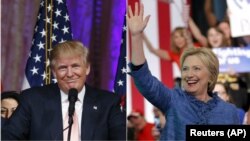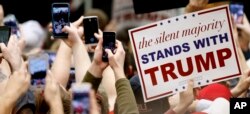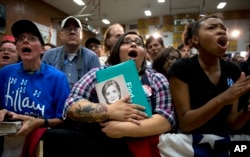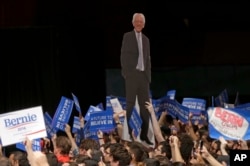U.S. Republican voters appear to have largely cast aside their reservations about presumptive presidential nominee Donald Trump, a key factor in boosting him into a dead heat with the likely Democratic nominee, Hillary Clinton.
For months Clinton, a former U.S. secretary of state, has held a double-digit percentage lead over Trump, a brash real estate mogul seeking his first elective office. But a spate of national polls in recent days shows the contest virtually even five and a half months ahead of November's national election.
"The Republican base has coalesced around Trump," said political scientist Stephen Wayne at Georgetown University.
Meanwhile, he said Democratic voters have yet to consolidate behind Clinton, who faces a remaining challenger — Vermont Senator Bernie Sanders — before likely clinching the Democratic nomination June 7, when the last key state nominating contests are held.
William Galston, a senior fellow at Washington's Brookings Institution, said Trump "has succeeded in consolidating his support with the Republican Party a lot faster than a lot of people thought he would be able to."
Conversely, he said, Clinton has had difficulty winning support from Sanders' most ardent backers.
In the months-long state-by-state contests against 16 other Republican contenders, Trump won 41 percent of the vote. But The Washington Post-ABC News poll showed Trump is now winning 85 percent support from Republicans in a matchup against Clinton, even as some key Republican figures, including 2012 party nominee Mitt Romney, have refused to endorse him.
Negative views
The U.S. polling shows both Trump and Clinton are viewed negatively by a majority of voters.
But Republicans, even if they supported one of Trump's Republican opponents, certainly view him as "the lesser of two evils" compared to Clinton, said Wayne.
Galston said he expects Clinton, the country's top diplomat from 2009 to 2013, to get a similar upswing in the polls when she clinches the Democratic presidential nomination, while Wayne says that if July's Democratic national nominating convention is "fairly cooperative" between Clinton and Sanders supporters, "I expect she'll get a bounce and go back in front" of Trump.
"There's an overarching issue here," Galston said. "People are clearly in the mood for change and the question I think that is most likely to decide this election is whether the American people feel safe and comfortable with the kind of change that Donald Trump is recommending.”
Galston added that he suspects "that [Trump] will attack [Clinton] as the candidate of the status quo and she will attack him as a loose cannon, reckless, someone who's too risky to take a chance on. And the people are going to have to make their judgment about their preference for the relative security that Secretary Clinton offers as opposed to the change, but risk, that Mr. Trump represents."
Wayne said the campaign to replace President Barack Obama when he leaves office next January could remain close all the way to November because "the country has near parity" between Republicans and Democrats.
Electoral college
U.S. elections, however, are not decided by the popular vote, but rather by the electoral college — with each state's electoral votes determined by its population and the number of senators and representatives it has in Congress. Numerous U.S. analysts, including Wayne, say Clinton holds the edge there, with the U.S. states with the biggest number of electoral votes mostly voting for Democratic presidential candidates over the last six elections.
Galston and Wayne said a variety of factors will play into the outcome.
"Let's look at history here," Galston said. "The stronger the incumbent two-term president is, the more likely the voters are to support the candidate of his own party to succeed him. And President Obama has improved his standing very considerably over the past six months, so that's one factor to keep in mind.
"At the same time, people are clearly discontented with the slow pace of the economic recovery," he said. "Jobs have come back a lot faster than wages. It is possible that we're at the beginning of a period of acceleration in wages. If that's the case, then people may be a little bit happier about the economy and their personal circumstances in six months than they are today. That would also be good news for Secretary Clinton."
However, said Wayne, "There's a lot we don't know yet" about the election, such as who either candidate will select as a vice-presidential running mate, the outcome of an investigation into Clinton's use of a private email server to handle her messages while she was secretary of state, and voters' reaction to Trump's business bankruptcies and lawsuits against his corporations.
For his part, Sanders says Clinton is "jumping the gun a little bit" in considering herself the Democratic nominee. He has acknowledged that he has only a narrow path to overtaking her, but says he expects to do "very well" in the nine remaining nominating contests.
"If we win the nomination, I assure you Donald Trump will not become president," Sanders told one rally over the weekend. Sanders called attention to the latest polls that show him defeating Trump by a bigger margin than Clinton — with some even show her trailing Trump.
VOA's Jesusemen Oni contributed to this report.







